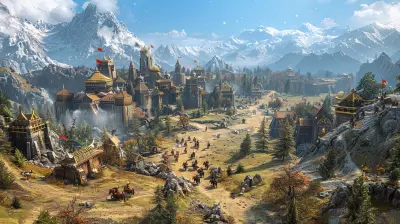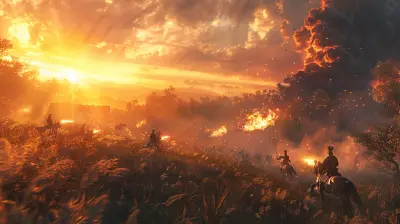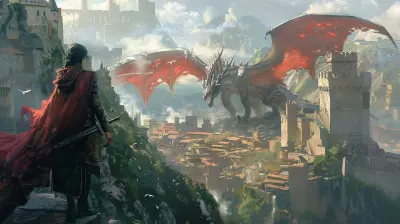Exploring the Rich History of Console Gaming Icons
23 May 2025
When it comes to console gaming, it's not just about individual games or the hardware itself—it's about the larger-than-life icons that defined entire generations. These gaming legends didn’t just hold controllers; they held the keys to our imaginations. From the pixelated mascots of the ’80s to the sleek, adrenaline-pumping protagonists of modern gaming, console history is packed with unforgettable faces and revolutionary ideas. So grab a joystick (or your DualSense), and let’s dive deep into the iconic characters that made console gaming what it is today. ![]()
The 8-Bit Era: Where It All Began
Ah, the good old days of the 1980s, where arcade-style gaming machines made their way into our living rooms. Back then, everything was measured in pixels, and yet, the impact of these early characters was huge.Mario: The Original Plumber-Turned-Superhero
Can we even talk about gaming icons without mentioning Mario? Introduced in 1981 in "Donkey Kong" as "Jumpman," Mario wasn’t originally the star of the show. But by the time the NES launched "Super Mario Bros." in 1985, our red-hatted Italian plumber skyrocketed into unprecedented levels of fame. He didn’t just jump on Goombas; he jumped into the cultural zeitgeist.Mario became the face of Nintendo, single-handedly saving the gaming industry from its 1983 crash. Think of him as the Elvis of video games—untouchable, universally recognized, and able to adapt with the times. Whether he's racing in go-karts or partying with friends, Mario’s legacy is unparalleled.
Sonic: Mario’s Cool-Talking Rival
If Mario was the squeaky-clean hero, then Sonic the Hedgehog was the rebellious teen your parents warned you about. Developed by SEGA in 1991, Sonic was fast, edgy, and oozed personality. He embodied the ’90s attitude, smashing through levels with his super-speed and spiky blue hair.Sonic wasn’t just a challenge to Mario—he was a statement. SEGA marketed Sonic as "blast processing" incarnate, showing off the Genesis console’s speed capabilities. Sonic carried SEGA on his back for years, and while his modern iterations have had ups and downs, there’s no denying his place as one of gaming’s biggest icons. ![]()
The 16-Bit Showdown: Mascot Mania
The console wars of the early ’90s hit peak intensity with the Super Nintendo and SEGA Genesis duking it out for living room dominance. Both consoles brought us bigger, bolder characters with better graphics and soundtracks to boot.Link: The Courageous Hero of Time
While Mario was busy jumping on turtles, Link was embarking on epic journeys to rescue Princess Zelda and save Hyrule from the clutches of evil. First appearing in 1986’s "The Legend of Zelda", Link became Nintendo’s poster child for adventure gaming.But it was with "A Link to the Past" in 1991 that he truly solidified his legendary status. Link didn’t have much to say (literally—he’s mute), but his courage, iconic green tunic, and Master Sword spoke volumes. He was every gamer’s fantasy avatar, proving that bravery and determination could save entire worlds.
Samus Aran: Gaming’s First Real Action Heroine
Before Metroid dropped in 1986, most gamers had no clue that Samus Aran—the badass bounty hunter in a high-tech space suit—was a woman. It was a mic-drop moment that shattered stereotypes, proving that women could kick just as much alien butt as men.With the release of "Super Metroid" in 1994, Samus became even more iconic. Her exploration-heavy gameplay laid the groundwork for what we now call "Metroidvania" games, and her power suit is still one of the most unique designs in gaming history. ![]()
The 3D Revolution: Entering a New Dimension
By the mid-’90s, gaming transitioned into 3D, transforming what characters could look like and how their worlds could be explored. This wasn’t just a step forward; it was a quantum leap.Lara Croft: The Tomb Raider Who Redefined Gaming
1996 was the year we met Lara Croft, the archaeologist-adventurer with a penchant for danger and a pair of pistols. "Tomb Raider" wasn’t just another action game—it was a cultural phenomenon. Lara was intelligent, athletic, and unapologetically bold, breaking boundaries for female representation in video games.Sure, early versions of Lara were criticized for being overly sexualized (those polygonal proportions, though), but over the years, she evolved into a more grounded, relatable character. By the time her reboots rolled in, Lara Croft wasn’t just the face of the franchise—she was a symbol of resilience in gaming.
Crash Bandicoot: The PlayStation Mascot That Spun Onto the Scene
Before Nathan Drake or Kratos, Sony’s PlayStation had Crash Bandicoot. This orange marsupial with an affinity for spinning like a Tasmanian devil became synonymous with the console during the late ’90s.Crash’s games were colorful, challenging, and packed with a weird sense of humor. He was PlayStation’s answer to Mario and Sonic, embodying the fun and energy that defined gaming at the time. And let’s not forget the infamous commercials where Crash trash-talked competitors like Nintendo—classic. ![]()
Modern-Day Titans: The Icons of Today
Gaming in the 2020s is a whole different beast. It's not just about consoles anymore; it's about universes, narratives, and experiences that rival Hollywood. But even in this cinematic era of gaming, certain characters continue to grab the spotlight.Master Chief: The Face of Halo and Xbox
When Microsoft entered the console market with the original Xbox in 2001, they brought along Master Chief, the Spartan super-soldier tasked with saving humanity. "Halo: Combat Evolved" wasn’t just a game—it was THE game that put Xbox on the map.Master Chief became a symbol of grit, resilience, and sacrifice, all while being one of the most iconic silent protagonists ever. He’s a man of few words, but when you hear that battle chant of “Halo’s” soundtrack, you know it’s game time.
Kratos: From Vengeful Antihero to Dad of the Year
If you’ve ever yelled “BOY!” at your TV screen, you already know who I’m talking about. Kratos, the Ghost of Sparta, debuted in 2005’s "God of War" as an angry, vengeance-driven demigod who tore through Greek mythology like a hurricane.Fast forward to 2018, and Kratos underwent a surprising evolution. Now a father navigating Norse mythology, he became one of the most emotionally complex characters in modern gaming. Who knew a guy who used to rip gods apart could make us feel ALL the feels?
Ellie: The Last of Us Protagonist Who Broke Our Hearts
Ellie from "The Last of Us" series is a shining example of how far gaming storytelling has come. Her journey from a wide-eyed teenager in the first game to a hardened survivor in the sequel is nothing short of masterful.She’s not just an icon for her LGBTQ+ representation in gaming but also for her raw humanity. Ellie isn’t perfect—she makes mistakes, she struggles, and she suffers. That’s what makes her unforgettable.
Why Console Gaming Icons Matter
So what makes these characters so iconic? Is it their powers, their stories, or the nostalgia they evoke? Maybe it’s a mix of all three. Gaming icons are more than just pixels or polygons—they're timeless companions that grow with us.Whether you’re a retro gamer with a soft spot for Mario or a modern fanatic worshipping Kratos, these icons shape our experiences, our memories, and even how we view the world. They’re not just characters; they’re legends.
So next time you fire up your favorite console, take a moment to appreciate the icons that got us here. They may have started off as bunches of code and sprite art, but they’ve become immortal in the hearts of millions.
all images in this post were generated using AI tools
Category:
Console GamesAuthor:

Pascal Jennings
Discussion
rate this article
3 comments
Renata Wheeler
Great article! I love how you highlight the evolution of console gaming icons. It’s fascinating to see how these characters shaped our gaming experiences over the years. Looking forward to more insights!
June 2, 2025 at 4:17 AM

Pascal Jennings
Thank you! I'm glad you enjoyed it. I appreciate your support and will definitely share more insights in the future!
Caroline Warner
Discovering the legacy of console gaming icons inspires us to celebrate innovation and creativity. Let's embrace the past while shaping the future!
May 28, 2025 at 4:15 PM

Pascal Jennings
Absolutely! Celebrating the legacy of these icons fuels our passion for innovation and creativity in gaming. Let's honor the past while driving towards an exciting future!
Karson Bell
Console gaming icons reflect not just technological evolution, but also cultural shifts, embodying nostalgia and innovation that shape our collective gaming identity across generations.
May 26, 2025 at 4:28 PM

Pascal Jennings
Absolutely! The evolution of console gaming icons mirrors both technological advancements and cultural changes, highlighting how these elements intertwine to influence our shared gaming experiences and identities over time.



